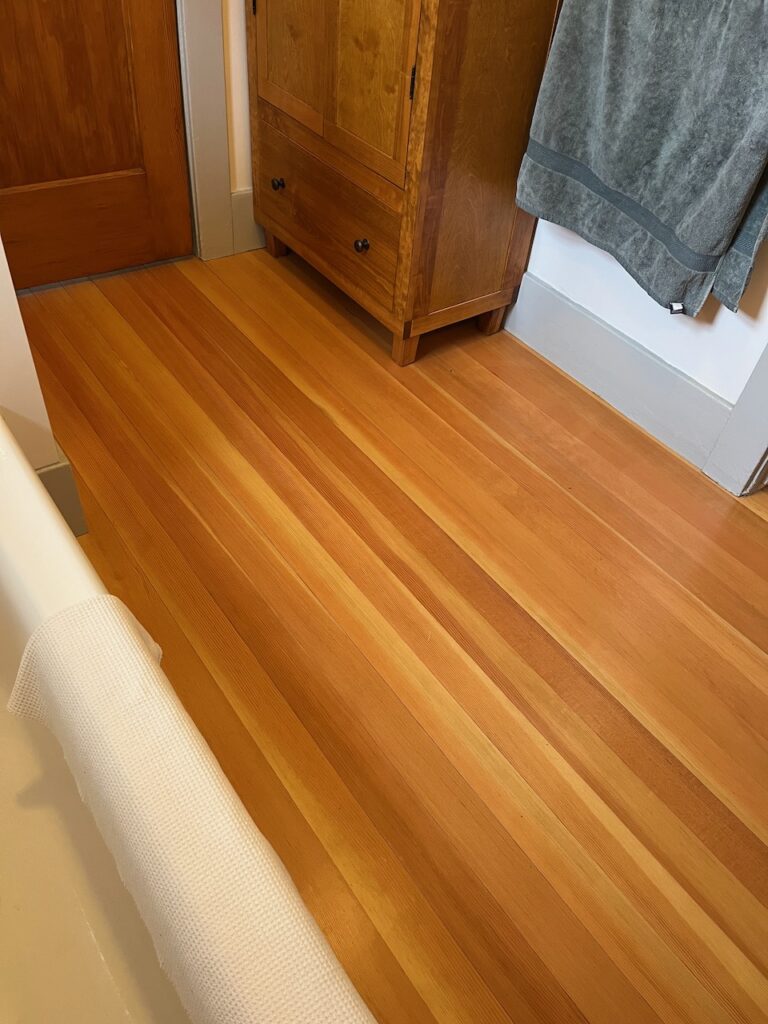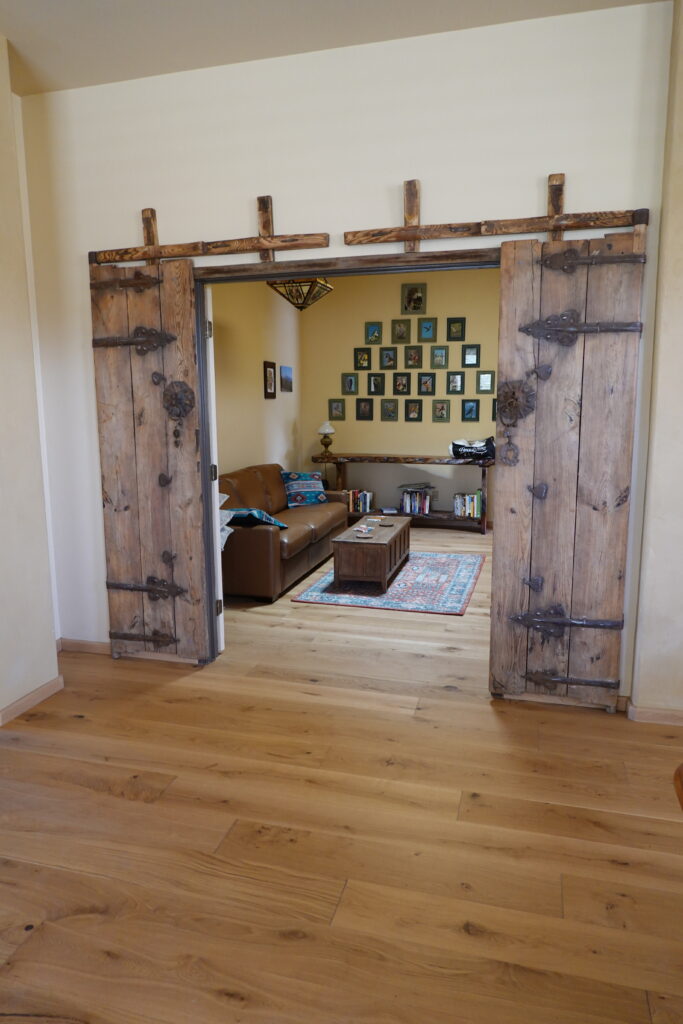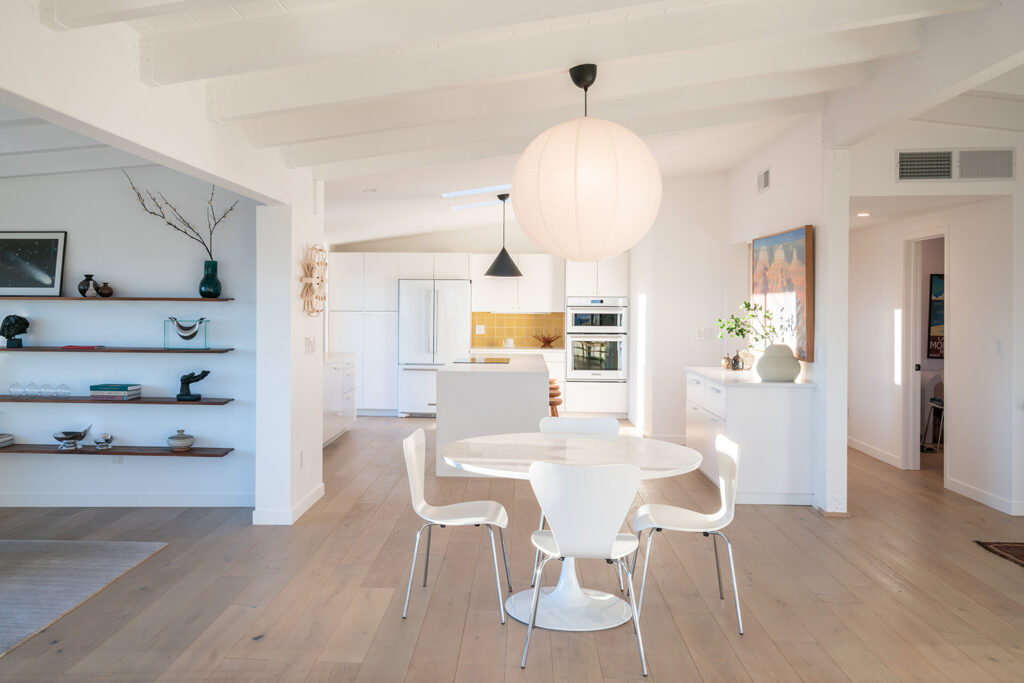
Solid Hardwood or Engineered Hardwood Comparison Guide
March 2, 2023
When looking for flooring for my own home I knew I liked the look of hardwood floors but had yet to learn the difference between engineered hardwood, and solid wood. Which flooring would last the longest, be comfortable and quiet, look the best, and stay within my budget? Wood flooring is a popular choice because it adds a natural warmth, color, and texture to a home. Below is a comparison of the two options with the pros and cons of each.
Solid Hardwood
There is nothing as beautiful and long-lasting as a solid hardwood floor. Oak, Maple, and Douglas Fir are the most commonly used woods but there are many other species available such as Hickory, Walnut, and Acacia. As the name implies this option is made of solid wood, generally ¾” thick, and has a tongue and groove construction. It can last 30-100 years and has the advantage that it can be sanded and refinished several times. Think of Victorian homes that still contain the original flooring from the early 1900s. Most solid wood floors come unfinished and they are sanded and finished in place. This leads to a higher install cost too.


Solid wood flooring is not the ideal choice in a basement or below grade, where moisture can be trapped. It also is not the best choice for bathrooms and laundry rooms where continuous exposure to water can easily warp the wood.
Solid wood flooring needs to be glued or nailed to a plywood sub-floor. If you have a concrete slab foundation the options are plywood on a slab or a sleeper system but both of these involve multiple steps, cost more for installation, and add to the thickness of the total floor installation. Glue down is the other option, although the glue adds to the cost and some glues can release VOCs.
Solid Hardwood pricing – $4.75 – $17.25/square foot (unfinished)
Installation – glue down starting at $4.50/square ft & nail down ranges from $7-10/square foot
Based on solid hardwood products sold at Originate Tucson, AZ.
AntiQuus Wood, Allwood, Sustainable NW Wood, Indoteak
Engineered Hardwood
Engineered hardwood flooring is made to look and feel like solid hardwood by using a thin layer of genuine hardwood over a high-quality plywood core or a lesser wood. This layer of hardwood means the floor can usually be refinished a few times depending on the thickness of the wear layer, between 1.5mm – 4mm.
You can choose between dozens of species and most come with a factory finish so they are ready to walk on the day they are installed. Engineered wood is available in both floating and glue/nail-down boards. The floating plank flooring is very DIY friendly and can be laid over ceramic tile, sheet vinyl, and existing wood.


Another plus is that engineered hardwood can be installed over a radiant heat system. However, you should check with the manufacturer before using a foam underlayment which can interfere with the heat flow. Using this type of flooring will work in a damp basement environment although it is not recommended for bathrooms and laundry rooms.
The planks of engineered hardwood are made with a micro-beveled edge which once installed makes the joints appear more obvious than solid hardwood floors. This may or may not appeal to your personal aesthetic. An engineered wood floor’s lifespan depends on the thickness of the wear layer. The thicker the layer of wood the longer it will last. With quality flooring, engineered hardwood can last 25-30 years.
Engineered Hardwood pricing – the thicker the wear layer the higher the cost.
2mm ranges from $6.60 – $9.50/square foot
3-4mm ranges from $7.25 – $14.50/square foot
Installation – Glue down from $4.50/square foot Floating from $3.75/square foot
Based on products sold at Originate Tucson, AZ
Allwood, Duchateau, Guild, Fabrica, Indoteak
| Hardwood | Engineered Hardwood | |
|---|---|---|
| Cost | $4.75 – $17.25/square foot (unfinished) | $6.60 – $14.50/square foot |
| Longevity, Durability | 30-100 years | 25-30 years |
| Sanding and Refinishing | 4 or more times | 1-4 times |
| Use in Damp Environments | May warp in humid and damp | Good for use in basements |
| Installation Options | Nail down, glue down | Nail down, floating, glue down |
| Underlayment Required | No | Yes |
| DIY friendly | No- more tools and skills required | Yes |
| Plank Thickness | 3/4 ” | 3/8″ – 5/8″ |
| Wear Layer | 1/4“ (6.35mm) | Range from 1mm – 4mm |
| Plank Width | 2-½” – 10” | 6mm is considered “extra thick” |
| Plank length | 1 – 16 feet | 4 – 7 feet |
If wood is the look you want you have plenty of options. Solid hardwood has been the gold standard for a long time but engineered hardwood has made significant leaps since it was introduced in the 1960s. Engineered wood flooring is an easier and faster install, thus it is chosen more often nowadays, particularly in the southwest where we mainly have concrete slab on grade construction. The longevity of solid hardwood or the flexibility of engineered hardwood, what will you choose?
